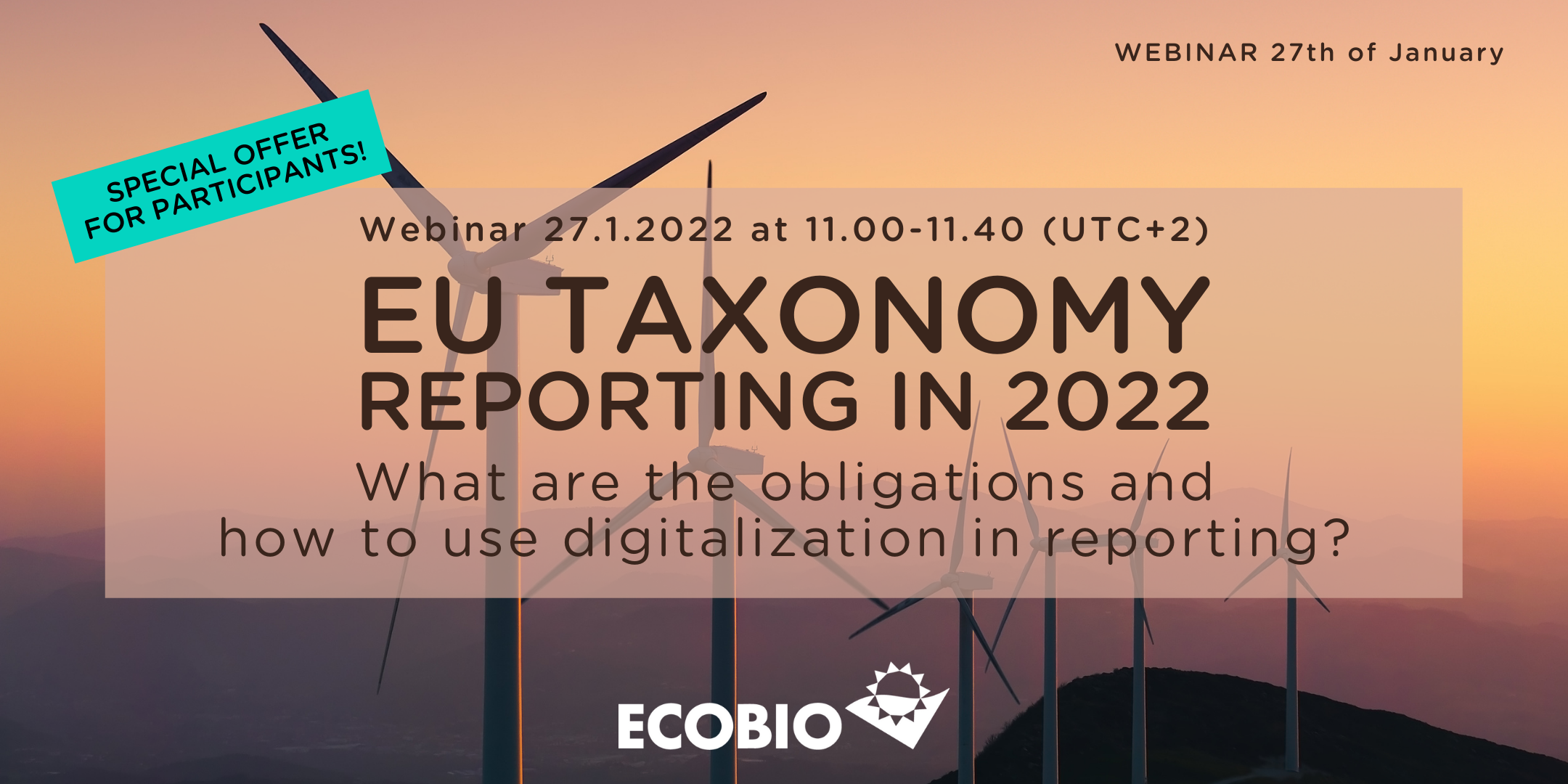
Corporate sustainability reporting requirements are taking a big leap forward and more detailed sustainability reporting will become obligatory in the EU for large and medium-sized companies.
Corporate sustainability reporting directive (CSRD) reporting is gradually affecting different-sized companies. With CSRD reporting, a larger part of companies operating in the EU will be covered by taxonomy reporting, and in addition, companies must publish more detailed information in connection with their activity report, e.g., about the environmental and social impacts of their business.
More and more companies are already now highlighting sustainability in their strategy and in their everyday business practices. Companies are aware that customers and investors are increasingly interested in sustainable products and responsible business, which makes them more willing to report about their sustainability goals and achievements.
To be able to effectively measure environmental and social impacts and to reach climate goals, companies will soon be provided with European sustainability reporting standards. Companies can already now start to prepare for the new sustainability requirements, hence making it easier to be compliant with reporting in due time.
Five steps to prepare for the Corporate Sustainability Reporting Directive (CSRD)
- Make sure your business is ready to be transparent. The legislation sets the minimum requirements, but responsible companies aim further than just to be compliant. There is no reason to wait until sustainability requirements are obligatory. Instead, commit to the climate goals and update your company’s due diligence also in other environmental, social and governance (ESG) areas. A good starting point is to recognise the material topics in sustainability and identify those that are the most relevant and important to your company. Understand how sustainability matters affect your business and what impacts your business has on people and the environment (double materiality principle).
- Top management commitment. Companies should prepare to mainstream sustainability in their strategy and targets and be ready to provide the information in their annual reports. CRSD will require to provide information on the role of the company board and management, and the resilience of the business model and strategy to risks and opportunities related to sustainability matters. Companies are expected to look forward in its impacts on sustainability matters, and appropriately consider the whole value chain, including its own operations, products and services and its business relationships and its supply chain.
- Connect your risk management and financial experts in sustainability topics. Companies’ risk management plays an important role in evaluating how sustainability matters, such as climate change, can affect the business in the short or long-term. Experts in risk management will be able to understand the business value based on the results of a comprehensive materiality assessment. On the other hand, as sustainability reporting must be in line with the financial data, the financial experts have the skills and experience to create a link between financial and non-financial (sustainability) information.
- Invest in reliable reporting. The EU Taxonomy requires companies to disclose certain KPIs (indicators) about their activities’ level of sustainability. The sustainability reporting standards will ensure that the reporting requirements and indicators are consistent with the EU Taxonomy. The standards will most likely facilitate the assurance of sustainability information which is also becoming a requirement for companies. High-quality preparation for reporting guarantees that company’s sustainability report passes the assurance, and the company can be trusted for what it informs about its impacts on people and the environment.
- Digitalise. In a few years, companies are required to disclose their EU Taxonomy disclosures and other financial and sustainability information in a digital, machine-readable format. There will be an EU-wide digital access platform for the company data. The common reporting standards will facilitate digitalisation, but before the standards will apply, companies are encouraged to digitalise the reporting. Companies and data users save time and money when sustainability data is easily available in a digital format.
Read more: CSRD reporting – the new obligations accelerate companies’ sustainable business activities
We can assist you in preparing for the upcoming CSRD reporting requirements. Our sustainability experts can help you guide your organisation towards sustainable development goals. Please contact our consultancy services:
You can read more about our consulting services here.
For EU-Taxonomy eligible companies, our newest whitepaper: EU-Taxonomy classification and reporting in 2023 – Eight steps to compliance whitepaper is a must-read.
Sources:
https://eur-lex.europa.eu/legal-content/FI/TXT/PDF/?uri=CELEX:52021PC0189&from=FR
https://data.consilium.europa.eu/doc/document/ST-6292-2022-INIT/fi/pdf
https://www.globalreporting.org/standards/standards-development/universal-standards/
https://www.globalreporting.org/standards/standards-development/universal-standards/






 Katrine Hoset
Katrine Hoset Sanna Perkiö
Sanna Perkiö Malena Weuerlander
Malena Weuerlander



